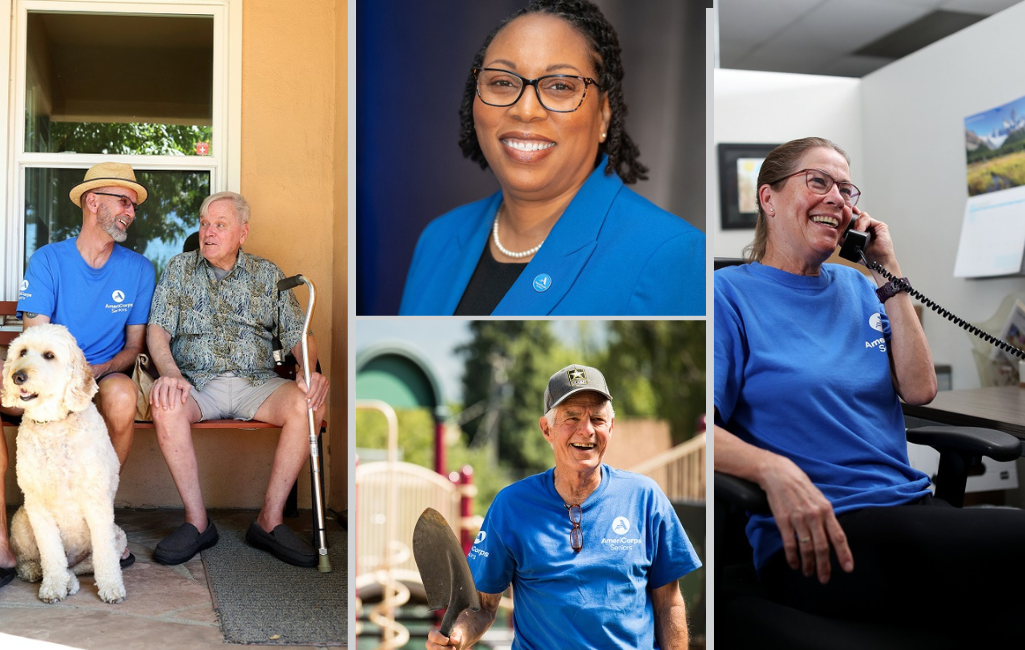By Atalaya Sergi
Service, sacrifice and camaraderie define a military career—you don’t just walk away from values like that—that’s why many veterans are still driven to serve. Through volunteering locally, you have the opportunity to employ the experience, insights and expertise you gained serving our country to help people.
As you think about what comes next after your military career, consider joining more than 12,000 veterans who serve as volunteers in AmeriCorps Seniors programs. We connect volunteers aged 55 and over with local organizations and service projects based on their abilities, experience, interests and community needs. In addition to other activities, AmeriCorps Seniors volunteers support disaster relief, staff crisis hotlines, deliver meals, grow community gardens, build houses, support homebound neighbors, tutor students and support vulnerable community members, including your fellow veterans.
We have three programs: the Foster Grandparent Program, the Senior Companion Program and RSVP.
Let’s meet some of our veteran volunteers who are helping to combat loneliness, preserve independence and ensure that we leave no one behind.
Combat Loneliness
Barry Russack retired from the Navy 30 years ago. Today, he is an AmeriCorps Seniors volunteer with RSVP serving in Connecticut’s Thames Valley Council for Community Action (TVCCA). TVCCA operates and organizes several Veterans Coffeehouses, where veterans and their spouses gather twice a month to socialize, drink coffee and receive vital information about available benefits and resources. The program hosts a range of speakers on topics such as healthy aging, retirement planning, new laws that affect veterans and caregiving services.
Russack assists with setup, makes coffee and greets attendees upon arrival. Russack’s trained therapy dog, Rosie, has the ability to sniff out anyone who needs additional comfort and emotional support, allowing Russack to approach those individuals and offer them a receptive ear and warm social interaction. The team at TVCCA say Russack has the kindest heart and service is his calling.
Preserve Independence
At 80 years old, Lou Lopez remains energetic and active as a longtime volunteer in the Senior Companion Program in Cheyenne, Wyoming. In his seven years with AmeriCorps, the Navy veteran has worked with nearly 13,000 primarily homebound clients ranging from ages 51 to 102 and dealing with conditions from visual impairments to Parkinson’s disease.
The support Lopez provides through respite care, running errands and being a friend helps give these people independence and dignity. He has a special affection for veterans, whom he also serves as a board member on the Veterans Committee of Wyoming Legal Aid.
Leave No One Behind
Army veteran James Hunter is an AmeriCorps Seniors volunteer in the Foster Grandparent Program in Kansas City, Missouri. After serving in the military, he struggled to overcome personal challenges in civilian life, including homelessness. Hunter sought help and turned his life around which inspired him to help others.
Today, he is a role model who mentors second-grade students in an impoverished area. Hunter nobly applies the creed, “leave no man behind,” in his local community. He’s a guide and shield protecting the next generation from some of the challenges he experienced.
You may be wondering where you may fit in amongst AmeriCorps Seniors’ more than 140,000 volunteers. Whether you can give only a few hours or up to 40 per week, we have hundreds of organizations across three programs.
Ways to Serve
The Foster Grandparent Program: AmeriCorps Seniors volunteers who serve as “grandparents” help children with emotional development, socialization and academic performance. Foster grandparents may participate in activities such as reading to at-risk children, assisting in a classroom or after-school program, or providing one-on-one mentoring and tutoring.
The Senior Companion Program: AmeriCorps Seniors volunteers help older adults who may struggle with illness or other challenges live more independently. From befriending homebound community members to helping clients with daily tasks and transportation, many lasting friendships have been formed through this program.
RSVP: Local organizations in RSVP focus across six areas—disaster services, economic opportunity, environmental stewardship, education, healthy futures and veterans and military members. Partially due to this breadth, RSVP tends to have the largest number of veteran volunteers.
Benefits of Camaraderie
Fraternity and community are one of the greatest benefits of the military. Those perks don’t have to end with retirement. While serving our country, you connected with fellow service members working toward a common cause. Now, during your next act, you can connect with other volunteers as you work towards improving your community.
Numerous studies, including the multi-decade Harvard Study of Adult Development, confirm that social ties and a sense of purpose are necessary for happiness. The Surgeon General describes loneliness and isolation as hazardous to individual and national health. Staying engaged and connected to people in your community through volunteering can help you maintain your health and sense of well-being.
A study published by AmeriCorps found that 74% of volunteers reported less depression, 84% of volunteers reported improved or stable health after one year of service and 88% reported feeling more connected and less isolated.
If you are 55 or older, AmeriCorps Seniors can help you find a nearby service program that matches your interests and schedule. The AmeriCorps Seniors Pathfinder tool is an easy way to search for local programs.
To learn more about how you can continue to serve your community, visit AmeriCorps.gov/YourMoment.
Atalaya Sergi leads AmeriCorps Seniors, the federal grantmaking office of AmeriCorps that is focused on engaging people aged 55 and over in outcomes-oriented service. She has more than 20 years of experience in service, community engagement and education, working in public and nonprofit sectors to bring private and public organizations together to ensure people of all ages, as well as those living in underserved communities, thrive.
Discover more articles for the veteran community here.


